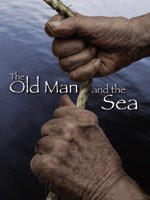
In every story the main character endures a problem or usually many problems. These problems could be mental or physical problems they endure. In the Old Man and the Sea Santiago goes through a number of both mental and physical problems that he overcomes to catch the biggest fish he has ever caught before. Santiago endures amazing physical pain everywhere on his body which is a physical problem. Also a big struggle he had to overcome was the fish was so big it was more powerful than him and he was only an old man so he had to find a way to beat him. Mentally Santiago was beat he had been trying to catch the big fish for three days now and he must have been ready to give up at many points but he stuck with it.
When Santiago first hooks the fish he has no idea of how big the fish really is until he gets it in close to the boat. At first he tried to pull him in but it was useless so he realized this was a pretty big fish and he had to beat him mentally. But physically after two days Santiago was hurt. His hands were bleeding and cut from the holding the line. Every pull the fish made it would worsen Santiago’s hands. Also he didn’t have any food or water so he had to catch his food. He caught a dolphin and ate some of that for some strength. He also found a flying fish inside the dolphin which would really help his strength. “He had no feeling in his left hand but he braked all he could with his right and the line rushed out” (82). This shows the pain Santiago had to go through but he never gave up.
Another problem Santiago had to endure was that the fish was so much more powerful he couldn’t beat him on pure strength. Santiago had to pull the fish in on circles so he could tire him out. Only he had another problem, he had to find the energy to do this. He couldn’t let the fish gain any ground when he pulled so this took a lot of strength. “The line went out and out but it was slowing now and he was making the fish earn each inch of it.” (83). So this shows how Santiago had to deal with the strength of the fish which was a huge problem.
Mentally Santiago was getting drained. He was after the fish for three days until he actually caught it and at times he was really close to just giving up. The strength it took and the pain was grueling and he felt he really couldn’t take any more of it. But somehow he found it inside himself to not give up and catch the fish. “It was a great temptation to resto in the bow and let the fish make one circle by himself without recovering any line.” (89). He wanted to give up but he never did so this shows his true character and how much he wanted it.
So you see all the grueling pain and problems Santiago had to endure while catching the fish. However he did catch the fish so it was all worth it. His hands and physical pain was killing him the whole trip but he still fought through it. The fish was so much stronger and bigger than Santiago that nobody would believe an old man like him could catch that fish after going 86 days without a single catch. The pain and lack of energy made him feel like quitting however he couldn’t do that he had to much respect for the fish. So this old man caught the biggest fish of his life and was very proud.





 3:24 PM
3:24 PM
 Mr. B-G
Mr. B-G

















